Yes, but that doesn't come until later. Around 1900. Until then Java was the main source of Indonesian income, which was used to fill the budget deficit every year. If that income falls away, I don't think the conquest of the rest of the archipelago could reasonably be financed.as far as i can remember there was some oil and gold in borneo and sulawesi, wasn't there?
The Most Sublime Porte - An Ottoman AAR
- Thread starter Riotkiller
- Start date
-
We have updated our Community Code of Conduct. Please read through the new rules for the forum that are an integral part of Paradox Interactive’s User Agreement.
You are using an out of date browser. It may not display this or other websites correctly.
You should upgrade or use an alternative browser.
You should upgrade or use an alternative browser.
Threadmarks
View all 63 threadmarks
Reader mode
Reader mode
Recent threadmarks
Chapter Fifty-Four: New Challenges (1928-1929) Chapter Fifty-Five: The Ottoman Golden Age (1930-1934) Chapter Fifty-Six: Scandal and Conflict (1934-1937) Chapter Fifty-Seven: The Caucasian War (Part I) Chapter Fifty-Eight: The Caucasian War (Part II) Chapter Fifty-Nine: The End of an Era (1938-1940) Chapter Sixty: The Bulldog Imperilled (1939-1943) Chapter Sixty-One: Troublesome Greeks (1943-1945)That would certainly be a very powerful trio for any war against Russia. We shall have to wait and see how Germany treats the Habsburgs now it is unified - but if Galicia-Lodomeria is anything to go by, it does not seem like rapprochement will occur any time soonAn alliance of a Germany and Ottomans who ate the Austro-Hungarians between themselves, and a unified Scandinavia would be something to be afraid of. It would be a good balanced alliance.
Here is another reason to return my AAR from hiatus, Boers trying to run the Europeans out of Africa. I really missed it
Indeed, the balance here is also important. Also, many tribes around the Caspian sea and pretty much everything north of Afghanistan are Turkic peoples. If the Ottomans are affected from the French Revolution ideals of nationality, there are brethren there to be freed from the yoke of the oppressive Czars.
Also, the Sikhs can be a good strategic partner for the future maybe?
Very good episodes, and I like the Greek communist flag. Keep up the good work man.
I was quite surprised when I noticed it - Very unusual to see peaceful Boer-British Relations. I shall be interested to read an AAR on that subject
Thanks!A very nice overview
I'm not really sure how the Dutch screwed up so badly there - they've fought multiple wars in the East Indies but only won about half of them. I have noticed that they're allied with Russia, so I wonder if they got called into a war against Japan and had their navy broken or something... Very unusual to see an independent Java, that's for sure!>Dutch kicked out of Java
Well, we done goofed up. That's pretty much everything valuable about Indonesia
not only against russia but even in case of a WW against the rest of the great powers including GBThat would certainly be a very powerful trio for any war against Russia. We shall have to wait and see how Germany treats the Habsburgs now it is unified - but if Galicia-Lodomeria is anything to go by, it does not seem like rapprochement will occur any time soon.
True, though Germany would have to do almost all of the fighting against the French, and it's unlikely Sweden-Norway (or myself) could fight a two fronted war against two GP's in the forms of Russia and wherever Britain shows up... We shall have to see where the diplomatic landscape lies come the time when Great Wars unlock.not only against russia but even in case of a WW against the rest of the great powers including GB
By the way, what happened to Belize? Is it independent, or did someone manage to take it away from the UK?
Ah yes. As part of the modding I did, I added events that give the European colonies in America cores in the latter stages of the game (as African decolonisation is already represented in DBZ due its later end date of 1951). In the case of Belize though, I forgot to write the event and it had the core from the start, and Britain has decided to release it as a DominionBy the way, what happened to Belize? Is it independent, or did someone manage to take it away from the UK?
Chapter Seventeen: The Eritrea, Sardinia-Piedmont, and the First Ottoman Census (1866-1870)
Sultan Abdulaziz was aware that upon his accession to the throne, he was going to have a hard time emulating the success of his brother. The return of Resid Pasha was a shrewd move to appease the liberals who had not enjoyed Abdulaziz’s spell as Grand Vizier, but the new Sultan was unwilling to give Resid Pasha the sort of freedom he had enjoyed during his first spell. Abdulaziz demanded a war to boost his prestige, but with the treasury empty, Resid Pasha was unwilling to launch any major fight that could bankrupt the Empire.
And so a compromise was made. Under the reigns of Selim I and Suleiman the Magnificent, the Ottoman Empire had taken control of much of Eritrea, ruling the area for half a century as the Elayet of Habesh. Ottoman forces were withdrawn from the Eritrean highlands during the rule of Murad III in 1571, but they maintained their claims to suzerainty over the local tribes. The reconquest of Egypt during the Oriental Crisis had seen Ottoman control expanded to the entire Sudan (which the Egyptians had conquered under Muhammad Ali Pasha), including most of Eritrea, but a narrow coastal strip around the port of Assab had never been conquered by the Egyptians.
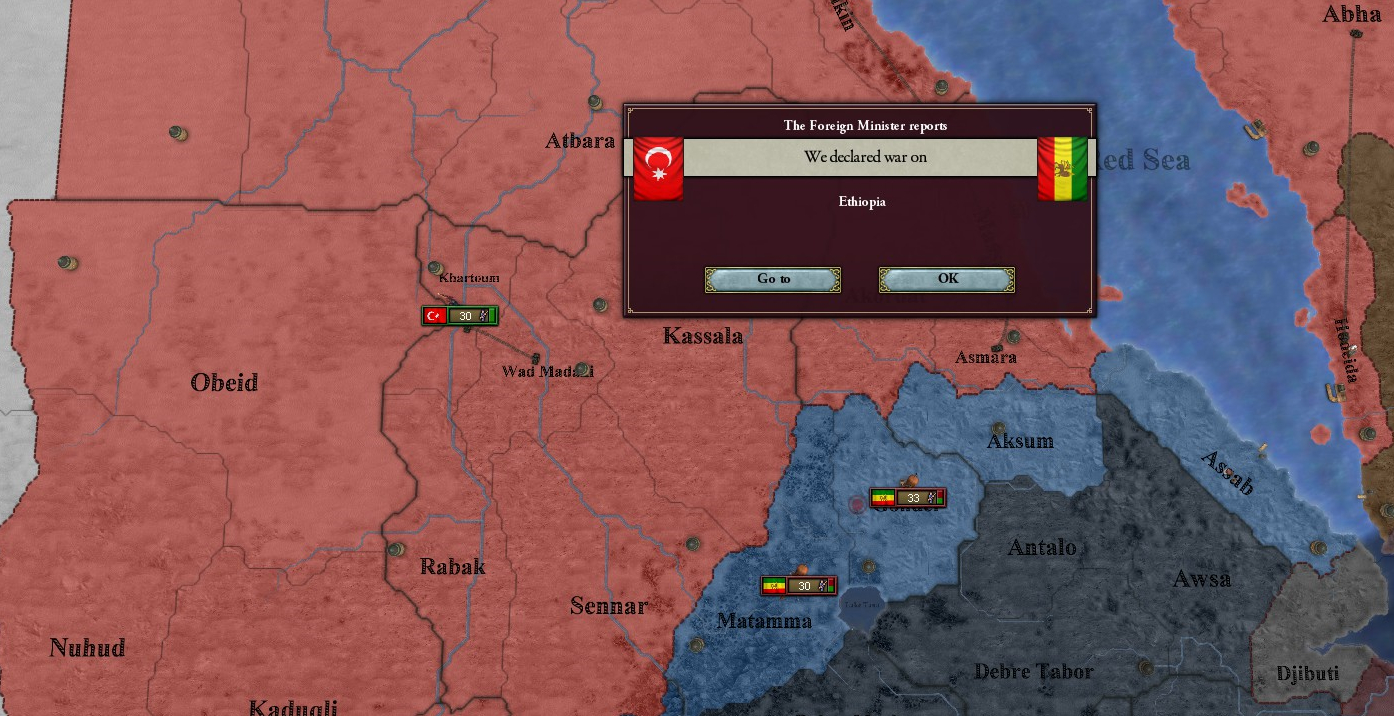
The Ottoman Empire declares war to reconquer Ethiopian Eritrea (June 6th 1866)
The port of Assab had recently been absorbed during the recent Ethiopian unification wars, and the local Muslim population were complaining of ill-treatment by their Christian overlords. So Resid Pasha declared war on June 6th 1866, aiming to appease the Sultan whilst also avoiding a prolonged fight. Whilst Ziya Bey’s Army of Egypt was sent to Assab and the Ethiopian armies marched into Ottoman Eritrea, Resid Pasha took personal command of the Army of the Sudan. By marching down the Blue Nile and then through the mountains past Lake Tana, Resid Pasha was able to circumvent the Ethiopian forces and seize their capital of Gonder in early September.
With the capture of Gonder, Resid Pasha also captured Emperor Tewodros II himself. The Emperor, who just a decade earlier had ended the Zemene Mesafint (Age of Princes) and reunified the country, was forced to concede Assab and grant the Porte extraterritoriality in return for his release: with the war ending after just three months as a result of this stunning success. Resid Pasha returned to Istanbul a hero, while Abdulaziz was mollified by the return of a historic Ottoman territory to our control. As a result, Resid Pasha once more instigated an era of peace for the Empire.
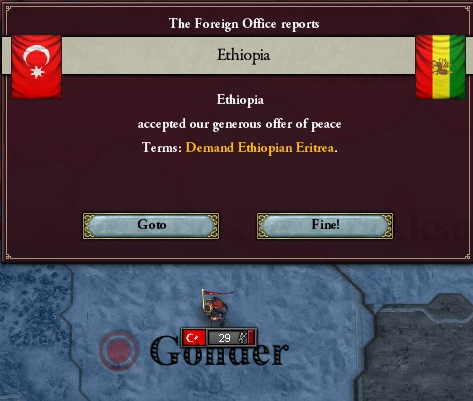
Ethiopia surrenders following the occupation of Gonder (September 19th 1866)
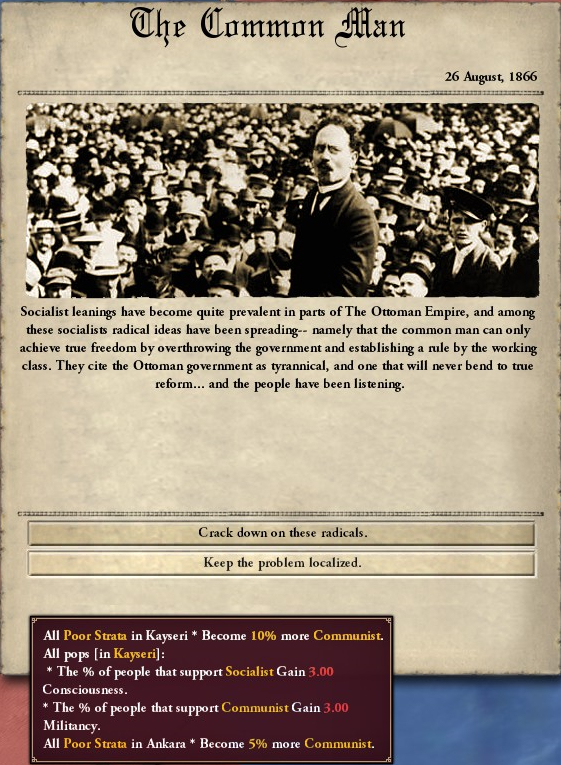
Communists gain a stronghold in the vilayet of Ankara (26th August 1866)
The German philosopher Karl Marx, and his colleague Friedrich Engels, had recently established a new philosophy of government known as “Communism”. Communists believed in an uprising of the working classes to overthrow the governments of Europe, replacing the aristocratic and bourgeois classes with a ruling urban proletariat. Whilst the followers of these radicals had remained localised to Western Europe at first, in 1866 the first undercurrents of communist fervour had been discovered by the Porte. Sultan Abdulaziz wanted to order an immediate crackdown, but Resid Pasha believed that drawing attention to them would in fact publicise their ideas and cause them to spread further. As such efforts were made to contain these ideas to the cities of central Anatolia, until a more permanent solution could be found.
With this possible new threat in mind, the Ottoman treasury became the key focus of the Porte in 1867, with debts incurred in recent years paid off by another rise of tariffs. The many wars of Europe in recent years had increased war-weariness across the continent, and so much to the delight of the Treasury, the Ottoman economy began to boom during the resultant European peace. Of the great powers of the world, the Spanish Empire was the only one involved in any conflicts, and their attempt to impose a new viceroyalty on Peru over the Chincha Islands Dispute was defeated in late 1867.
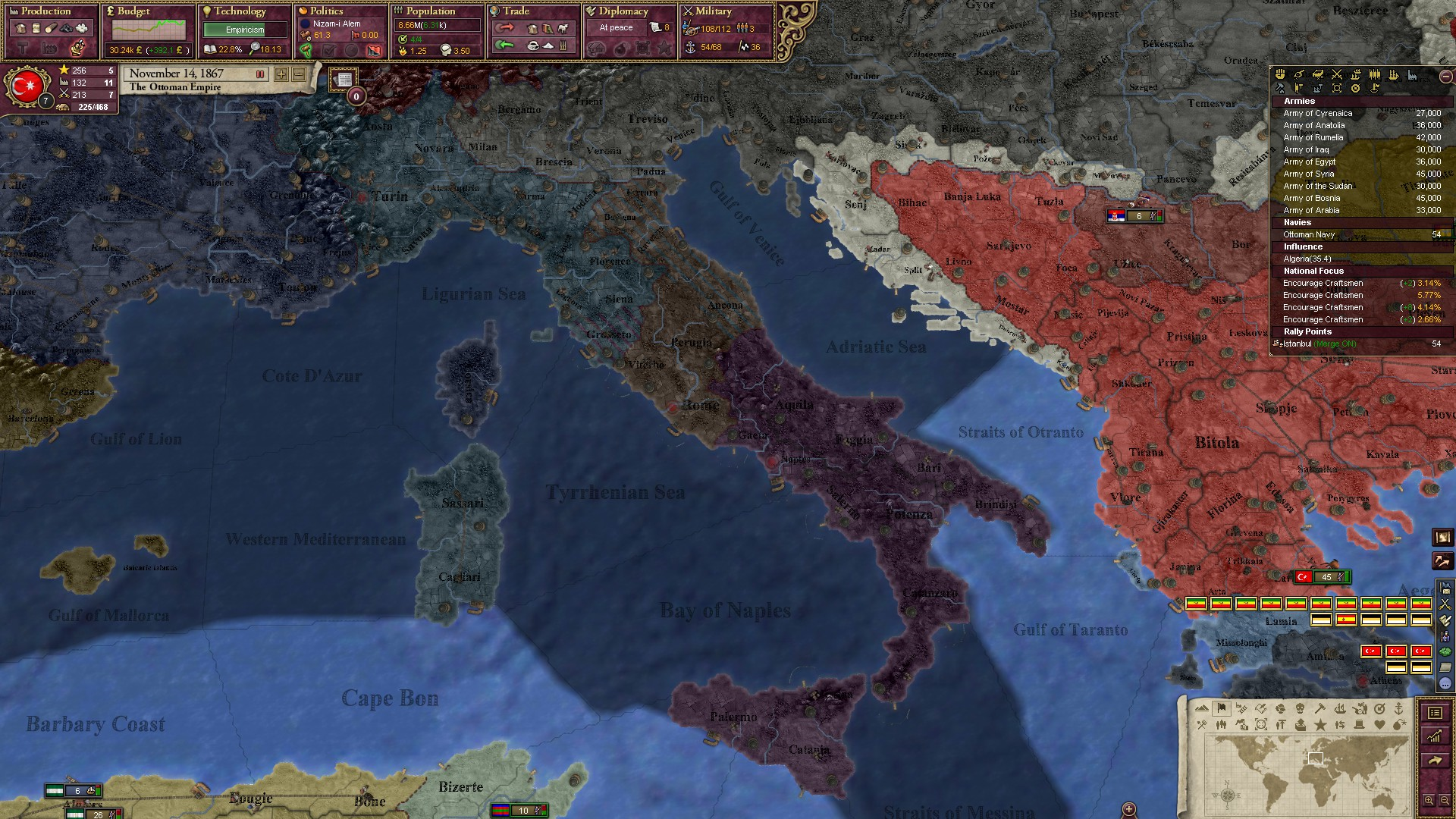
Sardinia-Piedmont followed the annexation of Tuscany by attacking the Papal States (November 14th 1867)
With both the Kingdom of France and the Habsburg Empire licking the wounds of their recent defeats, King Victor Emmanuel II of Sardinia-Piedmont saw this European peace as an opportunity to continue the struggle toward Italian Unification. An uprising in the Grand Duchy of Tuscany forced King Leopold II to hold a referendum, where the people overwhelmingly voted to abolish their foreign King and join with Sardinia. Following this peaceful annexation of Tuscany, the Kingdom of Sardinia-Piedmont declared war on the Papal States, and in winter 1867 the Pope surrendered the cities of Romagna to the Sardinians - despite the intervention of the Kingdom of the Two Sicilies on the Papal side.
This rapid expansion of Sardinian power, without the aid of their former French allies, saw them throw off their economic links to Paris. The rise of this independent Sardinia, and the simultaneous decline of the Spanish Empire following their loss in Peru, saw Sardinia-Piedmont raised to the ranks of the Great Powers, with Spain clearly now a regional power at best. The Sublime Porte was intrigued by this series of events, with diplomats sent to improve relations with the House of Savoy, but a far greater opportunity soon presented itself. The humbled Spaniards, fearing French reprisals for their tacit support of our forces in the recent Franco-Austrian war, turned to us for a full alliance; which Resid Pasha duly signed on July 16th 1868. The Ottoman-Spanish Alliance included a guarantee from the Spanish that they would not seek to interfere in Algeria, and limited their influence on the Maghreb to the Kingdom of Morocco.
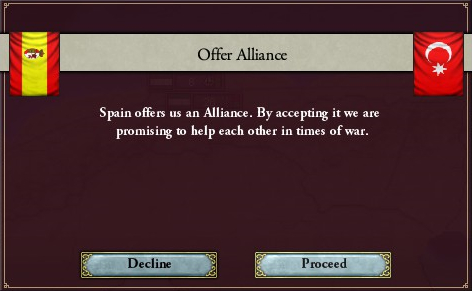
Resid Pasha signs the Ottoman-Spanish Alliance (July 16th 1868)
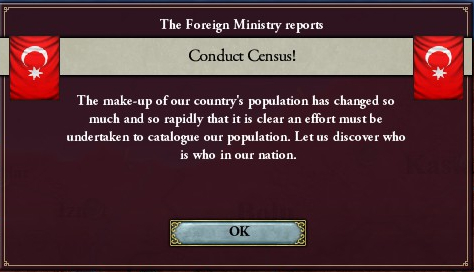
The Sublime Porte announces the first Ottoman Census (April 22nd 1868)
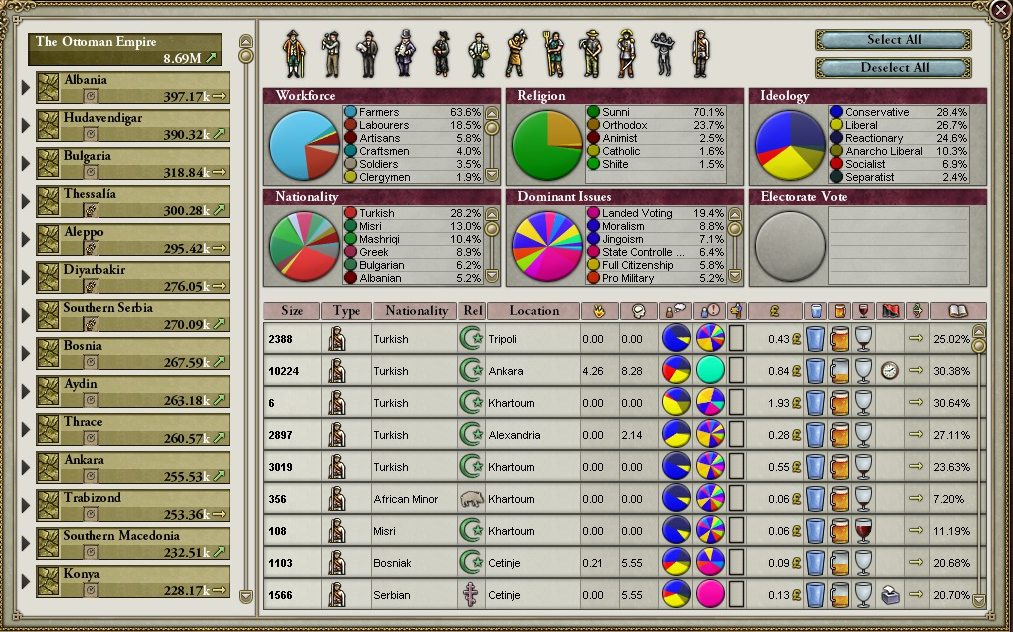
An overview of the 1868 Ottoman Census
With the influx of trade income from the new agreements with Spain, the Sublime Porte decided to hold the first census of the Ottoman Empire in 1868. With Sultan Abdulaziz still concerned by the communists in Anatolia, this was seen as excellent way to gather information on the population, as well as see how Resid Pasha’s Tanzimat reforms were working to integrate minorities into the Empire.
The results of the census were of much interest. The population of the Empire now stood at 8.79m households; while the Porte was surprised to discover that Albania was now the most populous vilayet in Ottoman territory. Sultan Abdulaziz was relieved to learn that just 4% of the people in the Empire were employed as Craftsmen, the “Proletariat” who were envisioned to lead a Communist society, but Resid Pasha was less pleased by this slow pace of industrialisation. The fact that just 28% of the population was Turkish also showed the importance of the continued integration of minorities, with the concept of “Ottomanism” only slowly taking hold.
Also of note was the improvement of the adult literacy rate to 23.2% - almost double what it had been 30 years ago, but still far below the rates of the industrialised world. The younger population were showing far better rates however, and the Porte took this as a sign that the education reforms implemented under Sultan Abdulmejid were succeeding. Resid Pasha therefore focused once more on increasing the rate of industrialisation in the Empire, with factories expanded to employ more workers. When the issue of child labour was raised following protests over young chimney sweepers on the island of Crete, Resid Pasha therefore had little sympathy - insisting that hard work was necessary for youngsters to develop, much to the delight of Conservatives in the Porte.
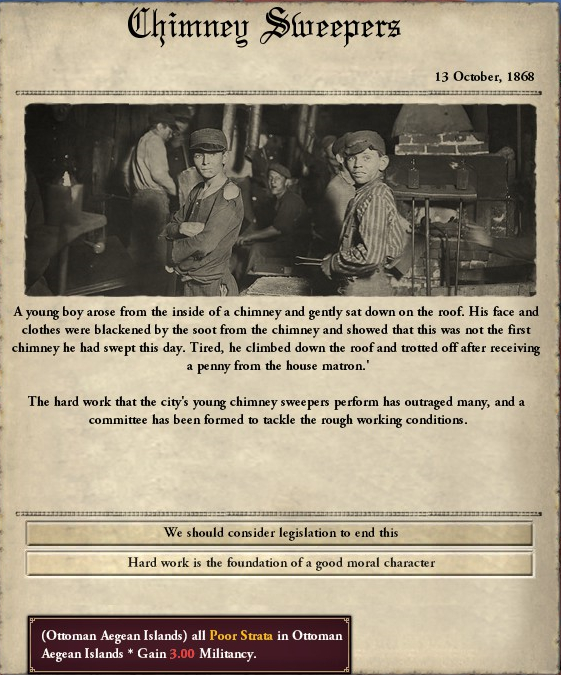
Legislation to end child labour was rejected despite protests in Crete (13th October 1866)
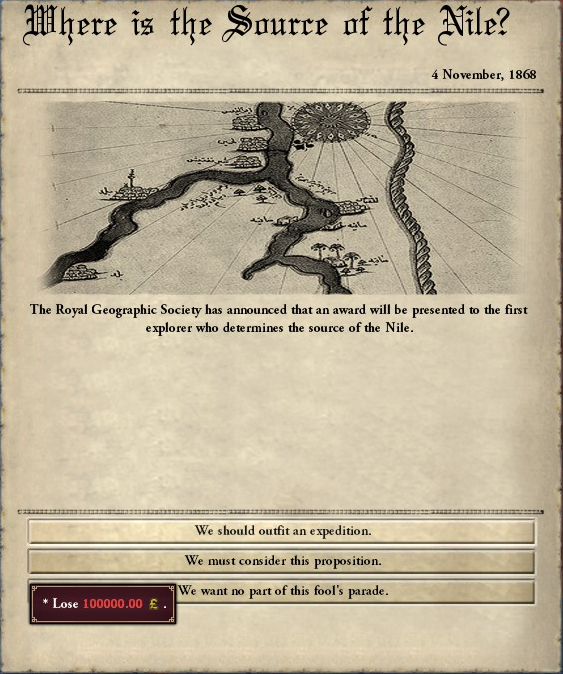
The outfitting of the First Ottoman Nile Expedition (4th November 1868)
In November 1868, Britain’s Royal Geographic Society announced an award would be issued to the discoverer of the source of the River Nile. While this had clearly been aimed at encouraging British explorers to map the African interior, Sultan Abdulaziz demanded that we outfit an expedition of our own, as much of the known Nile was under our direct rule. The first Ottoman Nile Expedition therefore set out on 21st November 1868, though it returned a year later without success. A second expedition was therefore financed in 1869, with better equipment for dealing with the hostile savannahs and jungles that had been discovered south of the Sudan.
Meanwhile, with the economy continuing to boom, the Porte made a new bid to host the latest World’s Fair in 1870, at the direction of Sultan Abdulaziz. These lavish outlays demonstrated the success of the Ottoman model to the world, with the Treasury still able to grow at a strong rate through 1869 and into 1870. And so, going into the summer of 1870, things looked rosy in the Ottoman Empire, with Resid Pasha once more proving himself to be a Grand Vizier of great talent, and the Empire stabilising after many years of war.
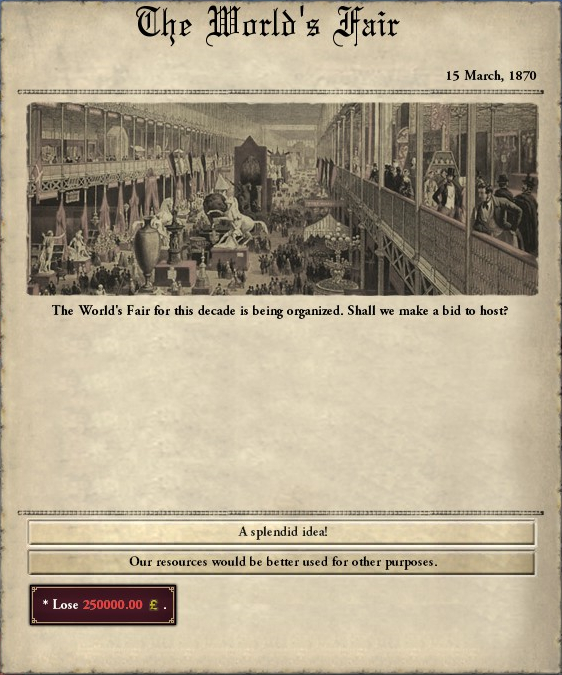
Grand Vizier Resid Pasha launches a new Ottoman bid to host the World's Fair in Istanbul (15th March 1870)
And so a compromise was made. Under the reigns of Selim I and Suleiman the Magnificent, the Ottoman Empire had taken control of much of Eritrea, ruling the area for half a century as the Elayet of Habesh. Ottoman forces were withdrawn from the Eritrean highlands during the rule of Murad III in 1571, but they maintained their claims to suzerainty over the local tribes. The reconquest of Egypt during the Oriental Crisis had seen Ottoman control expanded to the entire Sudan (which the Egyptians had conquered under Muhammad Ali Pasha), including most of Eritrea, but a narrow coastal strip around the port of Assab had never been conquered by the Egyptians.

The Ottoman Empire declares war to reconquer Ethiopian Eritrea (June 6th 1866)
The port of Assab had recently been absorbed during the recent Ethiopian unification wars, and the local Muslim population were complaining of ill-treatment by their Christian overlords. So Resid Pasha declared war on June 6th 1866, aiming to appease the Sultan whilst also avoiding a prolonged fight. Whilst Ziya Bey’s Army of Egypt was sent to Assab and the Ethiopian armies marched into Ottoman Eritrea, Resid Pasha took personal command of the Army of the Sudan. By marching down the Blue Nile and then through the mountains past Lake Tana, Resid Pasha was able to circumvent the Ethiopian forces and seize their capital of Gonder in early September.
With the capture of Gonder, Resid Pasha also captured Emperor Tewodros II himself. The Emperor, who just a decade earlier had ended the Zemene Mesafint (Age of Princes) and reunified the country, was forced to concede Assab and grant the Porte extraterritoriality in return for his release: with the war ending after just three months as a result of this stunning success. Resid Pasha returned to Istanbul a hero, while Abdulaziz was mollified by the return of a historic Ottoman territory to our control. As a result, Resid Pasha once more instigated an era of peace for the Empire.

Ethiopia surrenders following the occupation of Gonder (September 19th 1866)

Communists gain a stronghold in the vilayet of Ankara (26th August 1866)
The German philosopher Karl Marx, and his colleague Friedrich Engels, had recently established a new philosophy of government known as “Communism”. Communists believed in an uprising of the working classes to overthrow the governments of Europe, replacing the aristocratic and bourgeois classes with a ruling urban proletariat. Whilst the followers of these radicals had remained localised to Western Europe at first, in 1866 the first undercurrents of communist fervour had been discovered by the Porte. Sultan Abdulaziz wanted to order an immediate crackdown, but Resid Pasha believed that drawing attention to them would in fact publicise their ideas and cause them to spread further. As such efforts were made to contain these ideas to the cities of central Anatolia, until a more permanent solution could be found.
With this possible new threat in mind, the Ottoman treasury became the key focus of the Porte in 1867, with debts incurred in recent years paid off by another rise of tariffs. The many wars of Europe in recent years had increased war-weariness across the continent, and so much to the delight of the Treasury, the Ottoman economy began to boom during the resultant European peace. Of the great powers of the world, the Spanish Empire was the only one involved in any conflicts, and their attempt to impose a new viceroyalty on Peru over the Chincha Islands Dispute was defeated in late 1867.

Sardinia-Piedmont followed the annexation of Tuscany by attacking the Papal States (November 14th 1867)
With both the Kingdom of France and the Habsburg Empire licking the wounds of their recent defeats, King Victor Emmanuel II of Sardinia-Piedmont saw this European peace as an opportunity to continue the struggle toward Italian Unification. An uprising in the Grand Duchy of Tuscany forced King Leopold II to hold a referendum, where the people overwhelmingly voted to abolish their foreign King and join with Sardinia. Following this peaceful annexation of Tuscany, the Kingdom of Sardinia-Piedmont declared war on the Papal States, and in winter 1867 the Pope surrendered the cities of Romagna to the Sardinians - despite the intervention of the Kingdom of the Two Sicilies on the Papal side.
This rapid expansion of Sardinian power, without the aid of their former French allies, saw them throw off their economic links to Paris. The rise of this independent Sardinia, and the simultaneous decline of the Spanish Empire following their loss in Peru, saw Sardinia-Piedmont raised to the ranks of the Great Powers, with Spain clearly now a regional power at best. The Sublime Porte was intrigued by this series of events, with diplomats sent to improve relations with the House of Savoy, but a far greater opportunity soon presented itself. The humbled Spaniards, fearing French reprisals for their tacit support of our forces in the recent Franco-Austrian war, turned to us for a full alliance; which Resid Pasha duly signed on July 16th 1868. The Ottoman-Spanish Alliance included a guarantee from the Spanish that they would not seek to interfere in Algeria, and limited their influence on the Maghreb to the Kingdom of Morocco.

Resid Pasha signs the Ottoman-Spanish Alliance (July 16th 1868)

The Sublime Porte announces the first Ottoman Census (April 22nd 1868)

An overview of the 1868 Ottoman Census
With the influx of trade income from the new agreements with Spain, the Sublime Porte decided to hold the first census of the Ottoman Empire in 1868. With Sultan Abdulaziz still concerned by the communists in Anatolia, this was seen as excellent way to gather information on the population, as well as see how Resid Pasha’s Tanzimat reforms were working to integrate minorities into the Empire.
The results of the census were of much interest. The population of the Empire now stood at 8.79m households; while the Porte was surprised to discover that Albania was now the most populous vilayet in Ottoman territory. Sultan Abdulaziz was relieved to learn that just 4% of the people in the Empire were employed as Craftsmen, the “Proletariat” who were envisioned to lead a Communist society, but Resid Pasha was less pleased by this slow pace of industrialisation. The fact that just 28% of the population was Turkish also showed the importance of the continued integration of minorities, with the concept of “Ottomanism” only slowly taking hold.
Also of note was the improvement of the adult literacy rate to 23.2% - almost double what it had been 30 years ago, but still far below the rates of the industrialised world. The younger population were showing far better rates however, and the Porte took this as a sign that the education reforms implemented under Sultan Abdulmejid were succeeding. Resid Pasha therefore focused once more on increasing the rate of industrialisation in the Empire, with factories expanded to employ more workers. When the issue of child labour was raised following protests over young chimney sweepers on the island of Crete, Resid Pasha therefore had little sympathy - insisting that hard work was necessary for youngsters to develop, much to the delight of Conservatives in the Porte.

Legislation to end child labour was rejected despite protests in Crete (13th October 1866)

The outfitting of the First Ottoman Nile Expedition (4th November 1868)
In November 1868, Britain’s Royal Geographic Society announced an award would be issued to the discoverer of the source of the River Nile. While this had clearly been aimed at encouraging British explorers to map the African interior, Sultan Abdulaziz demanded that we outfit an expedition of our own, as much of the known Nile was under our direct rule. The first Ottoman Nile Expedition therefore set out on 21st November 1868, though it returned a year later without success. A second expedition was therefore financed in 1869, with better equipment for dealing with the hostile savannahs and jungles that had been discovered south of the Sudan.
Meanwhile, with the economy continuing to boom, the Porte made a new bid to host the latest World’s Fair in 1870, at the direction of Sultan Abdulaziz. These lavish outlays demonstrated the success of the Ottoman model to the world, with the Treasury still able to grow at a strong rate through 1869 and into 1870. And so, going into the summer of 1870, things looked rosy in the Ottoman Empire, with Resid Pasha once more proving himself to be a Grand Vizier of great talent, and the Empire stabilising after many years of war.

Grand Vizier Resid Pasha launches a new Ottoman bid to host the World's Fair in Istanbul (15th March 1870)
- 1
The Ottomans continue to play the game of nations quite well. A nice little victory over Ethiopia, but also nicely restrained.
A short, victorious war to recover territory long lost will certainly do wonders for public confidence in the military.
The Ottomans are slowly but surely modernizing, but at the moment they remain largely an agrarian society. I do have to wonder if the social pressures and upheavals that often come with industrialization will end up driving more people into the arms of the socialists, but that's a risk the Porte will have to take if they want to remain competitive...
The Ottomans are slowly but surely modernizing, but at the moment they remain largely an agrarian society. I do have to wonder if the social pressures and upheavals that often come with industrialization will end up driving more people into the arms of the socialists, but that's a risk the Porte will have to take if they want to remain competitive...
Chapter Eighteen: The Spanish Revolution and the Ottoman Constitution (1870-1872)
The decline of the Spanish Empire from its Great Power status in 1868 had had an immediate effects on the Spanish economy. As its former trading partners - particularly those in Portugal, but also across the Mediterranean world - began to look away from Spain and look instead to the new market of Sardinia-Piedmont; the large debts that Spain had incurred during the failed Chincha Islands venture began to spiral out of control, with the Spanish barely able to meet the interest payments. And so, in March 1870, the Spanish were forced to declare bankruptcy: Thus beginning an extremely serious sequence of events on the peninsula.
Whilst a small amount of Spanish debt had been owed to the Sublime Porte, Resid Pasha decided not to end the recently signed Ottoman-Spanish Alliance over it, with the Porte instead seeking to increase its influence in Iberia. The loss of Great Power status had seen the Spanish Cortes (Parliament) depose Queen Isabella II of the Bourbon Dynasty, with her attempts to meddle in politics being blamed for the Chincha Islands Affair. In an ironic twist, Aostan Duke Amadeo of the House of Savoy - the very house which ruled Sardinia-Piedmont and had replaced the Spanish as a Great Power - had been elected to the throne by the Cortes to replace the Bourbons.
King Amadeo was highly unpopular with much of the Spanish populace however, and following the Spanish bankruptcy the situation on the peninsula turned militant. Multiple conflicting uprisings began throughout Spain, led by republicans, by socialists, and most seriously by conservatives supporting the Carlist pretender Carlos VII (grandson of Carlos V, the “Infante Carlos” of the First Carlist War). In May 1870, Amadeo abdicated the throne of Spain and angrily declared the country “ungovernable” before returning to Italy, and an unstable Spanish Republic was born.
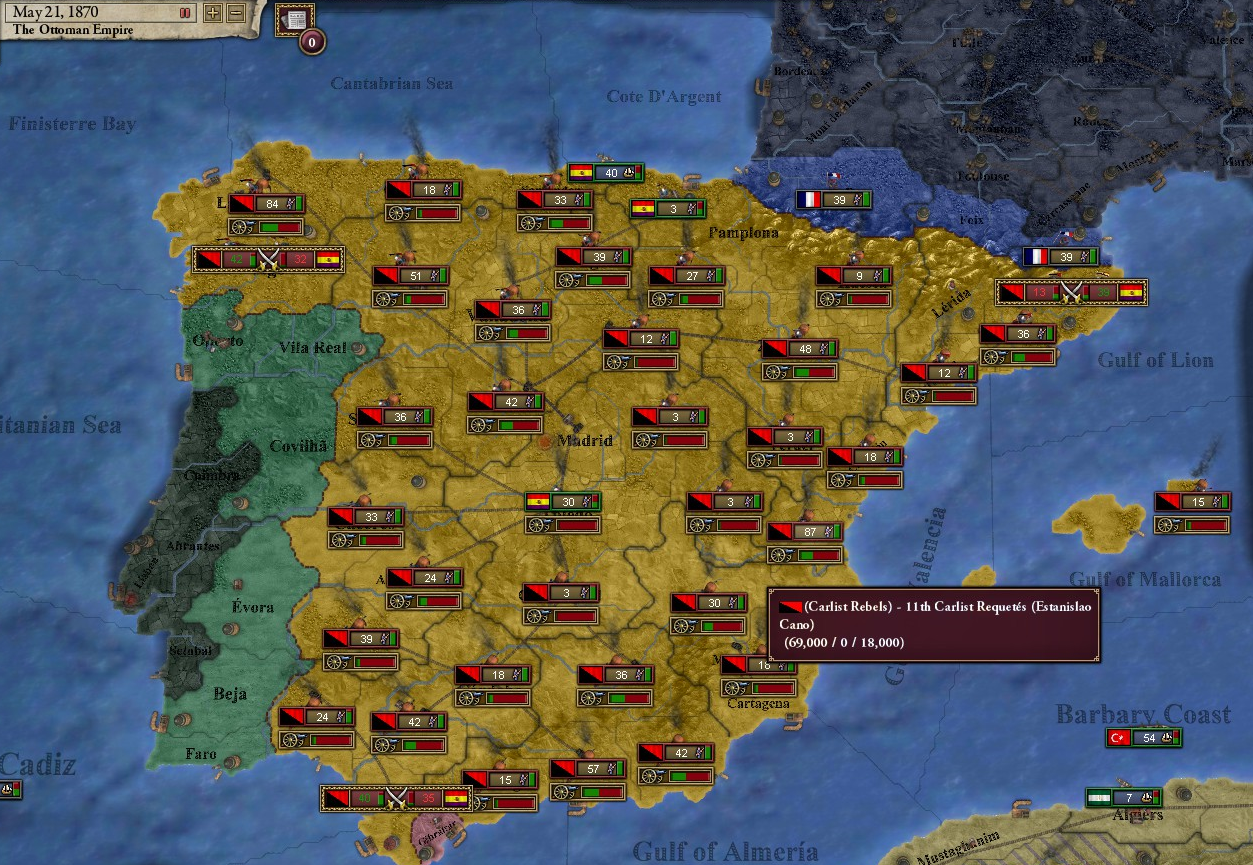
The Third Carlist War begins amidst the chaos of the Spanish Revolution (May 21st 1870)
The Republican government included many socialists, and this drove many liberal Catholics, who were opposed to the absolutism of the Carlists but uneasy with the secularism espoused by the leftist forces, toward supporting the claim of Alfonso de Bourbon, the son of the exiled Isabella II. This further split created yet more chaos in Spain, with the entire country aflame in a revolutionary fervour not seen the days of the French Revolution. The fragile coalition leading the Republican government, under moderate liberal Francisco Pi y Margall, controlled very little beyond Madrid, with the Third Carlist War having started following Carlist seizures of Galicia and Catalonia.
Margall’s government collapsed in August, after Socialist Antonio Galvez declared a rebellion in Cartagena and seized control of much of the Spanish Navy. Following the collapse of the government, officers of the Spanish Republican Army under General Martinez Campos stormed stormed the Cortes and arrested many leading Republicans, before declaring their allegiance to Alfonso de Bourbon. Whilst Alfonso accepted the crown as Alfonso XII, he hadn’t even returned to Spain before Madrid again fell, with the Carlist forces now storming the capital. The military government was overthrown in turn, and Carlos VII was crowned King of Spain on September 28th 1870.
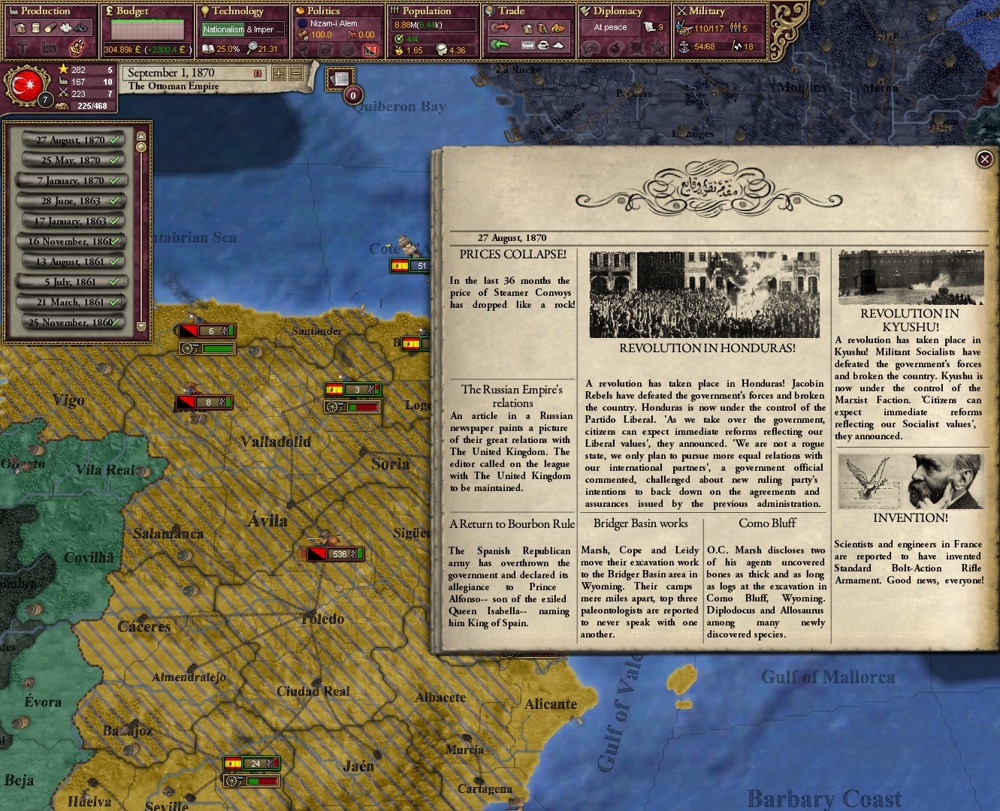
Alfonso de Bourbon was briefly restored to the Spanish throne as Alfonso XII in August 1870
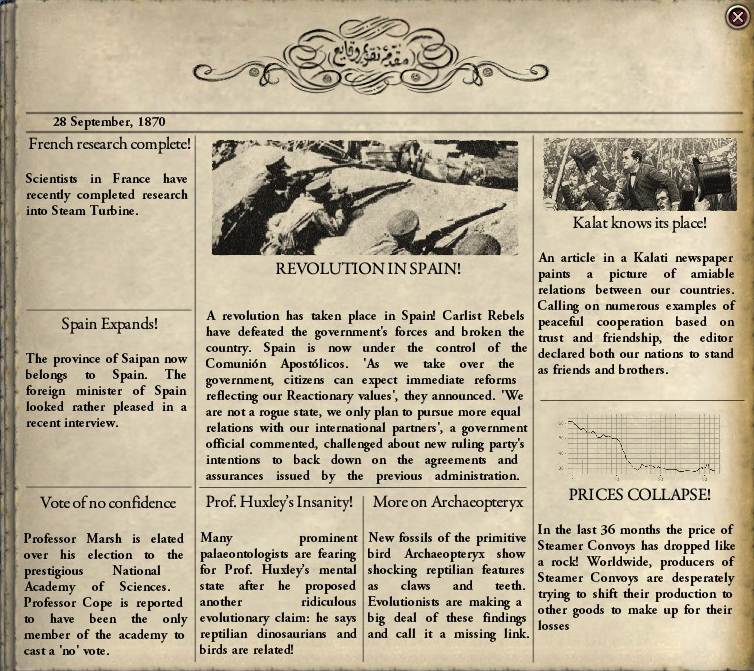
Carlos VII is crowned King of Spain following his victory in the Third Carlist War (28th September 1870)
Whilst the rest of the world had watched the ongoing chaos in Spain with horror, the triumph of Carlos VII did not cause undue panic in the Sublime Porte. Carlos moved quickly to assure the Ottoman ambassador that he intended to stick to the terms of the Ottoman-Spanish Alliance, with the Carlist Absolutism being ideologically similar to the rule of the Porte. Unfortunately for Carlos, he had promised significant autonomy for the Basque people in return for their support - a promise he immediately rescinded following his victory. The outraged Basques therefore agitated for full independence, and to the surprise of the world Tsar Alexander II of Russia decided to back the Basques - creating a new dynamic to the Spanish Crisis.
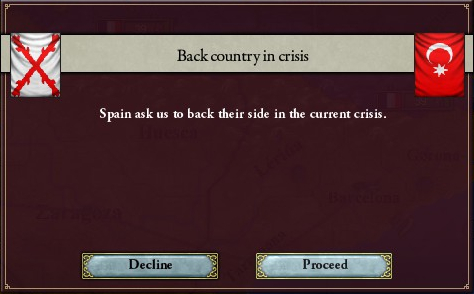
Carlos VII asks us for backing over the Basque Crisis (September 30th 1870)
The Sublime Porte had already announced their backing for Carlos, and it was strongly suspected that Russia was backing the Basques solely in order to justify attacking us. Whilst Carlos VII had succeeded in ending the open rebellions in Spain, the crisis remained unresolved heading into winter 1870, with the Porte frantically attempting to win international support following this sudden escalation.
In the meantime, the Porte had been delighted by the announcement that Istanbul had been selected to host the World’s Fair of 1871. Whilst Sultan Abdulaziz wanted to spend as much as possible to create the most magnificent of spectacles, Grand Vizier Resid Pasha ensured that a measure of prudence was maintained to reign in the excesses of the Sultan. Sadly, it was soon revealed that one of Abdulaziz’s organisers for the Fair had been rather creative in the accounting, and a gigantic hole had appeared in the finances of the Committee in charge - rendering Resid Pasha’s frugality for naught.
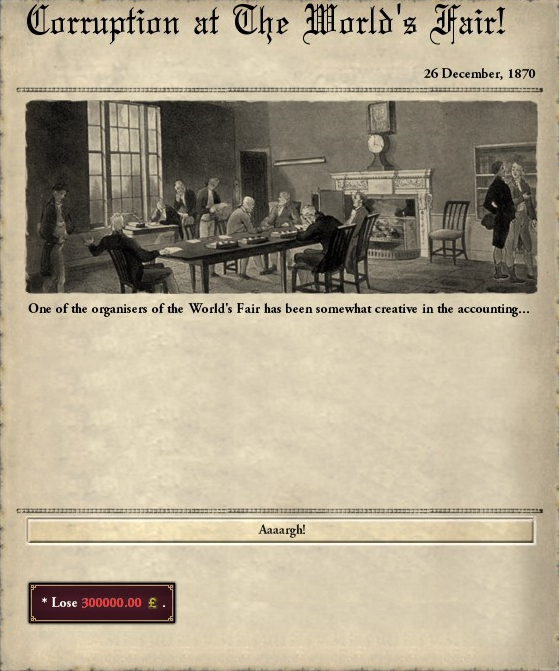
A corruption scandal led to the Istanbul World Fair going hugely over budget
In early 1871 our ally Otto von Bismarck announced German support for us in backing the Carlists - no doubt also keen to establish friendly relations with Spain and gain a future ally against the French. To the surprise of many, the Kingdom of Sardinia-Piedmont followed suit - despite the fact that Carlos had originally risen up when Spain was under the rule of Amadeo of the Sardinian royal house. As a result, on March 25th 1871, the Russians backed down. The Basque uprising was defeated, and the period of the “Spanish Revolution” came to an end.
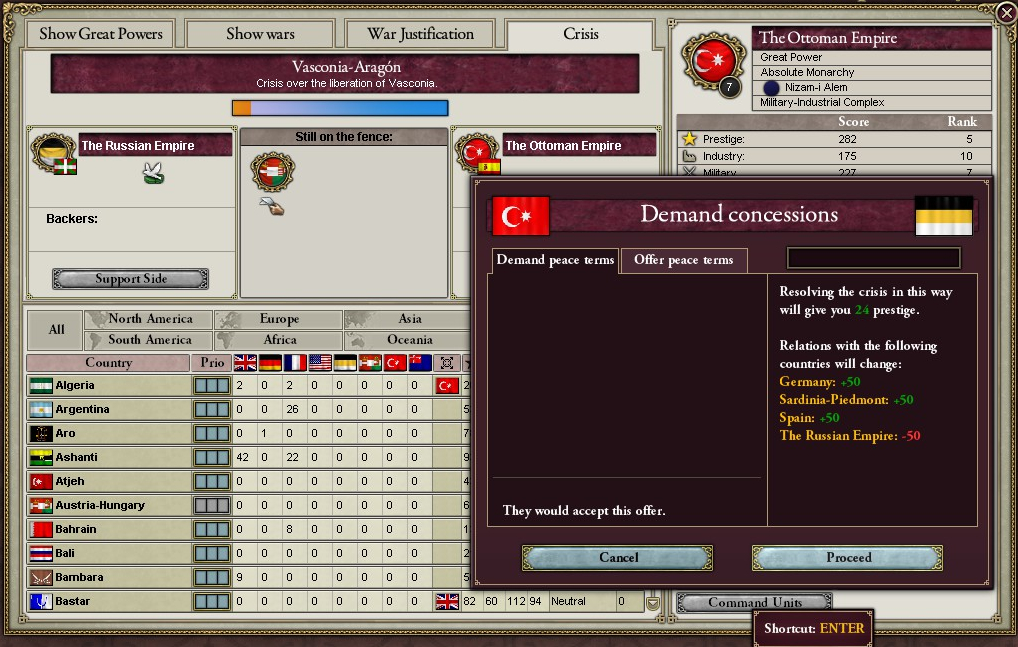
Russia is forced to back down over the Basque Crisis (March 25th 1871)
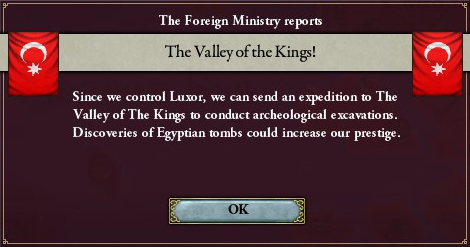
Sultan Abdulaziz sends an expedition team to the valleys surrounding the city of Luxor (May 10th 1871)
To celebrate the diplomatic success of the Porte on the global stage, Resid Pasha called a new National Conference to coincide with the upcoming World’s Fair, bringing the greatest minds of the Empire to the capital in time for the event. And in May 1871 Sultan Abdulaziz also ordered the sending of an archaeological expedition to the city of Luxor in Egypt; with rumours of ancient tombs in the nearby valleys having captured his attention following the recent discovery of the lost city of Troy, by a German excavation team in Anatolia. It was with this cultural backdrop that the World’s Fair officially began in September 1871.
The Fair, whilst far from the disaster it had been feared it might be following the discovery of the corruption on the committee, was unfortunately deemed to be fairly average by the rest of the world upon the end of it in April 1872. This relative disappointment for the Porte was compounded a month later, when an expedition sent by Emperor Franz Josef of the Habsburg Empire beat the Third Ottoman Nile Expedition to discovering the Source of the great river (the Second Expedition had mysteriously disappeared); much to the chagrin of the Sultan. This was nothing compared to the horror that would soon follow though. On May 26th 1872, whilst Abdulaziz was visiting the city of Adana, an unknown assassin fired at the Sultan’s carriage; narrowly missing the Sultan but wounding one of his consorts.
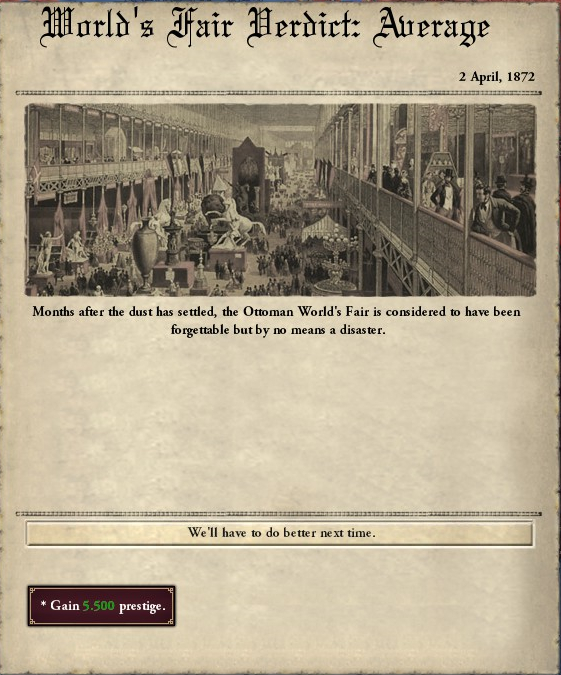
The Istanbul World Fair received mixed reviews across the world

An assassin makes an attempt on the life of the Sultan (26th May 1872)
The Sultan was hurried back to the safety of the Capital immediately, but it was clear that the Porte would need to act to ensure the security of the Empire. The assassination attempt, and the mediocrity of the World’s Fair, had once more soured relations between Resid Pasha and the Sultan. As a result, Resid Pasha made a proposal to Abdulaziz in November 1872: The Porte would pass a Constitution for the Empire, enfranchising landholders across the Empire, but Resid Pasha would not stand in the resulting election, and would retire from politics for good. Abdulaziz, knowing that simply removing the Grand Vizier could cause uproar amongst liberals in the population, begrudgingly agreed. And so, on January 23rd 1873, the Ottoman Empire transitioned to a Constitutional Monarchy; and the first Ottoman election was officially called.
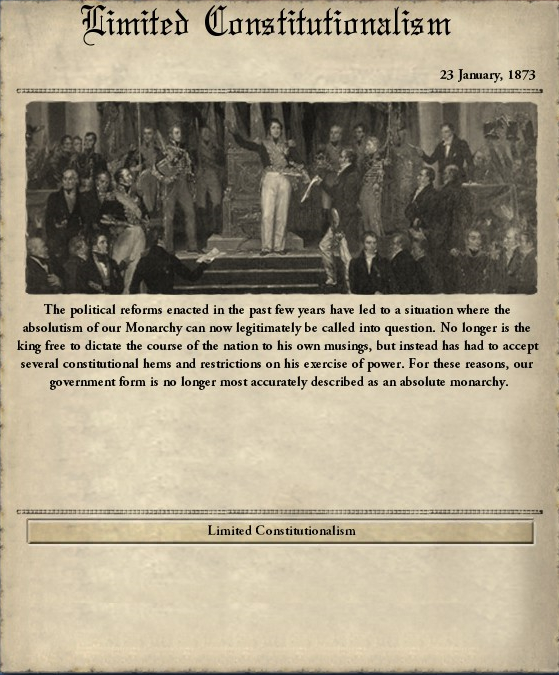
Whilst a small amount of Spanish debt had been owed to the Sublime Porte, Resid Pasha decided not to end the recently signed Ottoman-Spanish Alliance over it, with the Porte instead seeking to increase its influence in Iberia. The loss of Great Power status had seen the Spanish Cortes (Parliament) depose Queen Isabella II of the Bourbon Dynasty, with her attempts to meddle in politics being blamed for the Chincha Islands Affair. In an ironic twist, Aostan Duke Amadeo of the House of Savoy - the very house which ruled Sardinia-Piedmont and had replaced the Spanish as a Great Power - had been elected to the throne by the Cortes to replace the Bourbons.
King Amadeo was highly unpopular with much of the Spanish populace however, and following the Spanish bankruptcy the situation on the peninsula turned militant. Multiple conflicting uprisings began throughout Spain, led by republicans, by socialists, and most seriously by conservatives supporting the Carlist pretender Carlos VII (grandson of Carlos V, the “Infante Carlos” of the First Carlist War). In May 1870, Amadeo abdicated the throne of Spain and angrily declared the country “ungovernable” before returning to Italy, and an unstable Spanish Republic was born.

The Third Carlist War begins amidst the chaos of the Spanish Revolution (May 21st 1870)
The Republican government included many socialists, and this drove many liberal Catholics, who were opposed to the absolutism of the Carlists but uneasy with the secularism espoused by the leftist forces, toward supporting the claim of Alfonso de Bourbon, the son of the exiled Isabella II. This further split created yet more chaos in Spain, with the entire country aflame in a revolutionary fervour not seen the days of the French Revolution. The fragile coalition leading the Republican government, under moderate liberal Francisco Pi y Margall, controlled very little beyond Madrid, with the Third Carlist War having started following Carlist seizures of Galicia and Catalonia.
Margall’s government collapsed in August, after Socialist Antonio Galvez declared a rebellion in Cartagena and seized control of much of the Spanish Navy. Following the collapse of the government, officers of the Spanish Republican Army under General Martinez Campos stormed stormed the Cortes and arrested many leading Republicans, before declaring their allegiance to Alfonso de Bourbon. Whilst Alfonso accepted the crown as Alfonso XII, he hadn’t even returned to Spain before Madrid again fell, with the Carlist forces now storming the capital. The military government was overthrown in turn, and Carlos VII was crowned King of Spain on September 28th 1870.

Alfonso de Bourbon was briefly restored to the Spanish throne as Alfonso XII in August 1870

Carlos VII is crowned King of Spain following his victory in the Third Carlist War (28th September 1870)
Whilst the rest of the world had watched the ongoing chaos in Spain with horror, the triumph of Carlos VII did not cause undue panic in the Sublime Porte. Carlos moved quickly to assure the Ottoman ambassador that he intended to stick to the terms of the Ottoman-Spanish Alliance, with the Carlist Absolutism being ideologically similar to the rule of the Porte. Unfortunately for Carlos, he had promised significant autonomy for the Basque people in return for their support - a promise he immediately rescinded following his victory. The outraged Basques therefore agitated for full independence, and to the surprise of the world Tsar Alexander II of Russia decided to back the Basques - creating a new dynamic to the Spanish Crisis.

Carlos VII asks us for backing over the Basque Crisis (September 30th 1870)
The Sublime Porte had already announced their backing for Carlos, and it was strongly suspected that Russia was backing the Basques solely in order to justify attacking us. Whilst Carlos VII had succeeded in ending the open rebellions in Spain, the crisis remained unresolved heading into winter 1870, with the Porte frantically attempting to win international support following this sudden escalation.
In the meantime, the Porte had been delighted by the announcement that Istanbul had been selected to host the World’s Fair of 1871. Whilst Sultan Abdulaziz wanted to spend as much as possible to create the most magnificent of spectacles, Grand Vizier Resid Pasha ensured that a measure of prudence was maintained to reign in the excesses of the Sultan. Sadly, it was soon revealed that one of Abdulaziz’s organisers for the Fair had been rather creative in the accounting, and a gigantic hole had appeared in the finances of the Committee in charge - rendering Resid Pasha’s frugality for naught.

A corruption scandal led to the Istanbul World Fair going hugely over budget
In early 1871 our ally Otto von Bismarck announced German support for us in backing the Carlists - no doubt also keen to establish friendly relations with Spain and gain a future ally against the French. To the surprise of many, the Kingdom of Sardinia-Piedmont followed suit - despite the fact that Carlos had originally risen up when Spain was under the rule of Amadeo of the Sardinian royal house. As a result, on March 25th 1871, the Russians backed down. The Basque uprising was defeated, and the period of the “Spanish Revolution” came to an end.

Russia is forced to back down over the Basque Crisis (March 25th 1871)

Sultan Abdulaziz sends an expedition team to the valleys surrounding the city of Luxor (May 10th 1871)
The Fair, whilst far from the disaster it had been feared it might be following the discovery of the corruption on the committee, was unfortunately deemed to be fairly average by the rest of the world upon the end of it in April 1872. This relative disappointment for the Porte was compounded a month later, when an expedition sent by Emperor Franz Josef of the Habsburg Empire beat the Third Ottoman Nile Expedition to discovering the Source of the great river (the Second Expedition had mysteriously disappeared); much to the chagrin of the Sultan. This was nothing compared to the horror that would soon follow though. On May 26th 1872, whilst Abdulaziz was visiting the city of Adana, an unknown assassin fired at the Sultan’s carriage; narrowly missing the Sultan but wounding one of his consorts.

The Istanbul World Fair received mixed reviews across the world

An assassin makes an attempt on the life of the Sultan (26th May 1872)
The Sultan was hurried back to the safety of the Capital immediately, but it was clear that the Porte would need to act to ensure the security of the Empire. The assassination attempt, and the mediocrity of the World’s Fair, had once more soured relations between Resid Pasha and the Sultan. As a result, Resid Pasha made a proposal to Abdulaziz in November 1872: The Porte would pass a Constitution for the Empire, enfranchising landholders across the Empire, but Resid Pasha would not stand in the resulting election, and would retire from politics for good. Abdulaziz, knowing that simply removing the Grand Vizier could cause uproar amongst liberals in the population, begrudgingly agreed. And so, on January 23rd 1873, the Ottoman Empire transitioned to a Constitutional Monarchy; and the first Ottoman election was officially called.

- 1
Aye. Further expeditions into Abyssinia can be ordered later if deemed desirable, once the treasury has fully recovered.The Ottomans continue to play the game of nations quite well. A nice little victory over Ethiopia, but also nicely restrained.
Well, if industrialisation merely continues at the current pace, then the upheaval might be rather muted. If we are successful in accelerating it, however, then the socialist menace may indeed become a very major threat.A short, victorious war to recover territory long lost will certainly do wonders for public confidence in the military.
The Ottomans are slowly but surely modernizing, but at the moment they remain largely an agrarian society. I do have to wonder if the social pressures and upheavals that often come with industrialization will end up driving more people into the arms of the socialists, but that's a risk the Porte will have to take if they want to remain competitive...
Mind you, the treasury isn't likely to recover with all this creative accounting.
In My Swedish game a white back Spain ended up in a cycle of revolution after revolution, was quite fun to watch.
In My Swedish game a white back Spain ended up in a cycle of revolution after revolution, was quite fun to watch.
how are we positioned for the start of scramble for africa? in this mod, which techs etc are needed and which do we lack? is the porte intent on colonizing much or just doesn't care a lot?
Hmm.
Loved your AAR man.
I wonder how much being a constitutional monarchy would affect the Osmanischreich.
Loved your AAR man.
I wonder how much being a constitutional monarchy would affect the Osmanischreich.
Somehow the Spanish have managed to keep secondary power status through all of that, so I think they should be able to stabilise... It was certainly quite interesting watching the repeated flag changes in the space of those few months though!Mind you, the treasury isn't likely to recover with all this creative accounting.
In My Swedish game a white back Spain ended up in a cycle of revolution after revolution, was quite fun to watch.
Well, the mod uses inventions as opposed to techs (can't remember if vanilla does too). Ideological Thought and Medicine both come with early inventions that I have (though by themselves they only unlock places like Central Asia and Arctic Canada), and then Nationalism & Imperialism and Breech-Loaded Rifles trigger the other two. I've researched both techs, but the inventions won't be triggered before 1880 and 1900 respectively.how are we positioned for the start of scramble for africa? in this mod, which techs etc are needed and which do we lack? is the porte intent on colonizing much or just doesn't care a lot?
Most of Africa, and the Congress of Berlin to start the Scramble, will be unlocked in ~1880 when the first invention triggers. A few areas that were colonised later historically (Tanganyika, Namibia, Niger and Chad iirc), plus the Pacific Islands will only be unlocked in 1900ish with the second invention.
The main issue for the Porte is that most of our Colonial Points are already tied up in the Levant and Egypt, meaning that further colonisation will be quite difficult. The main way to get more Colonial Points in DBZ is via Naval techs (and they're spread out, so you have to get multiple techs rather than just beelining one or two), which it's very hard to fit in given the low literacy rate's effect on research time. There's still a few boosts from Cultural and Commerce techs that are more of a priority, but the Porte is unlikely to have a large store of CP ready for the Scramble to trigger. One benefit of taking Assab is that this blocks a quick European route to take all of Ethiopia, which does buy us a bit more time.
Thanks, glad you're enjoying!Hmm.
Loved your AAR man.
I wonder how much being a constitutional monarchy would affect the Osmanischreich.
Well, it did happen twice IRL; though the first was quickly abrogated by the Sultan of the time, and the second saw the Young Turks take the Empire into WW1... Let us hope that this timeline proves more successful
very much like vanilla. and how do we make Levant & Egypt into full states? spend some more colonial points but in the end free them all like vanilla?Well, the mod uses inventions as opposed to techs (can't remember if vanilla does too). Ideological Thought and Medicine both come with early inventions that I have (though by themselves they only unlock places like Central Asia and Arctic Canada), and then Nationalism & Imperialism and Breech-Loaded Rifles trigger the other two. I've researched both techs, but the inventions won't be triggered before 1880 and 1900 respectively.
Most of Africa, and the Congress of Berlin to start the Scramble, will be unlocked in ~1880 when the first invention triggers. A few areas that were colonised later historically (Tanganyika, Namibia, Niger and Chad iirc), plus the Pacific Islands will only be unlocked in 1900ish with the second invention.
The main issue for the Porte is that most of our Colonial Points are already tied up in the Levant and Egypt, meaning that further colonisation will be quite difficult. The main way to get more Colonial Points in DBZ is via Naval techs (and they're spread out, so you have to get multiple techs rather than just beelining one or two), which it's very hard to fit in given the low literacy rate's effect on research time. There's still a few boosts from Cultural and Commerce techs that are more of a priority, but the Porte is unlikely to have a large store of CP ready for the Scramble to trigger. One benefit of taking Assab is that this blocks a quick European route to take all of Ethiopia, which does buy us a bit more time.
Well, I need to get 1% bureaucrats of an accepted culture (and Turkish is the only one I have atm) to turn them into full states, which is very difficult.very much like vanilla. and how do we make Levant & Egypt into full states? spend some more colonial points but in the end free them all like vanilla?
I could release them as vassals, but it's unlikely that any African province would be as profitable as the Levant or Egypt, plus I dislike the gamey strategy.
Oh yes now I remember yes that was a big pain to try to promote accepted culture bureucrats. Although it's interesting that real life accepted bureucrat cultures are not added in the game and it's only Turkish. In fact, compared to the population, a smaller ratio of Turks were bureucrats than, say, Greeks, Armenians, Jews, Albanians or Slavs. Moreover, ethnicity was not as important as today so many non Turkic sunni (Arabian, Kurdish, Circassian etc) bureucrats without a very distinguishing non Turkic feature was also recorded as Turkish and so are whoever converted to Islam for one reason or another. For example heterodox Muslim Turks such as Alevis were a group much more ostracized from the bureucracy than non Turks or non Muslims.Well, I need to get 1% bureaucrats of an accepted culture (and Turkish is the only one I have atm) to turn them into full states, which is very difficult.
I could release them as vassals, but it's unlikely that any African province would be as profitable as the Levant or Egypt, plus I dislike the gamey strategy.
What I'm trying to say is, as a result of the imperial administration the Ottomans had, in reality any Sunni, Jewish, Orthodox or even Coptic bureucrat should satisfy the requirement without any regard to accepted cultures to turn those places into states which were in real life very much so. Since you're already using a personal mod, you might want to add that in (or if that is hard coded, add a modifier that assimilates any bureucrats under TUR tag into Turkish culture to show they are indeed accepted) if you find this explanation satisfactory. Having 1% of any kind of bureucrats is difficult enough anyway
Fascinating affairs both at home and abroad (look at Spain!)
I'm very interested in seeing how these elections go...
I'm very interested in seeing how these elections go...
Threadmarks
View all 63 threadmarks
Reader mode
Reader mode

